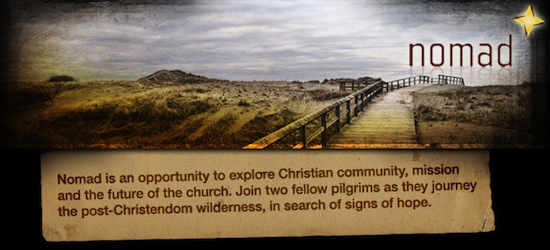We run our website the way we wished the whole internet worked: we provide high quality original content with no ads. We are funded solely by your direct support. Please consider supporting this project.
A Godless Congregation
 Tim Nash and his wife, Hannah, live in Nottingham, England, and are church planters for the Methodist Church. They started a Jesus-centered community called Garden-City, which is becoming a wonderful spiritual family for young followers of Jesus and spiritual seekers. For the last few years Tim has also been producing Nomad Podcast, a podcast that interviews leading thinkers and practitioners from around the world, to help us all explore a Jesus-centered, missional lifestyle. They had Greg on the show a few years ago, and they interviewed him again a couple of weeks ago (although that one won’t go online for a few months).
Tim Nash and his wife, Hannah, live in Nottingham, England, and are church planters for the Methodist Church. They started a Jesus-centered community called Garden-City, which is becoming a wonderful spiritual family for young followers of Jesus and spiritual seekers. For the last few years Tim has also been producing Nomad Podcast, a podcast that interviews leading thinkers and practitioners from around the world, to help us all explore a Jesus-centered, missional lifestyle. They had Greg on the show a few years ago, and they interviewed him again a couple of weeks ago (although that one won’t go online for a few months).
Here’s a piece Tim wrote after a recent visit to an atheist church.
It’s interesting that England used to be a Christian country, in some senses at least, but is now one of the world’s most secular nations. It’s also home to a new atheist church. In January, two comedians launched The Sunday Assembly — a church that “never mentions God”. No joke. Each week, about 300 atheists meet in London to sing, listen to talks, plan missions and enjoy a sense of community. And it’s spreading, with atheist churches springing up in cities around the UK, the US and Australia. As one of the founders said: “We’ve inadvertently sparked a global movement!” I wonder if this godless congregation — which is how The Sunday Assembly refers to itself — stands as a prophetic warning to the church.
So I went to one of their services and interviewed one of the founders for Nomad Podcast.
My first impression was that The Sunday Assembly does indeed feel like a church. As we walked in, people were mingling. The leader was greeting people at the door. And the band was setting up. The only difference at this point was that the faithful were filling the seats from the front (in my church experience, they usually fill up from the back!). When things got started, all the traditional elements of a service were evident — singing, sermon, notices, reflections and encouragement to join small groups and mission events. This call to mission provided one of the few references to church, when the leader challenged the congregation to “try and outdo the church at doing good”. There was even communion. Well, sort of — this month’s guest speaker was a wine expert, who passed around a glass of red for people to share.
We noticed only two striking differences to a Christian church. First, the service was a lot funnier (it’s led by two comedians). And second, there were no references to God or Jesus.
I found this challenging. Just how different is what we’re doing in our Christian churches from what they’re doing in their atheist church? On the surface, the only difference is language. We talk about Jesus, they don’t. But actually, how significant is this?
It reminded me of what Paul said to the followers of Jesus in Corinth: “I didn’t come to you with wise and persuasive words, but with a demonstration of the Spirit’s power” (1 Cor. 2:4).
Surely our faith is more than just words. Surely it is more than language that separates us from the atheists. Paul went on to say that when people who aren’t followers of Jesus come into a Christian gathering they will “fall down and worship God, exclaiming, ‘God is really among you!'” (1 Cor. 14:25).
So I don’t think the primary difference between us and the atheists is language. It has to be the presence of Jesus. Without the radically transforming presence of Jesus in our gatherings, are we not, for all intents and purposes, just another atheist church?
Category: General
Tags: Atheism, Presence of God, Tim Nash
Related Reading

Don’t Be a Functional Atheist at Christmas
All of us raised in Western culture have been strongly conditioned by what is called a secular worldview. The word secular comes from the Latin saeculum, meaning “the present world.” A secular worldview, therefore, is one that focuses on the present physical world and ignores or rejects the spiritual realm. To the extent that one…

Why Bart Ehrman Doesn’t Have to Ruin Your Christmas (Or Your Faith) Part 3
This is the third of several videos Greg put together to refute Bart Ehrman’s claims published in the article What Do We Really Know About Jesus? If you missed the first two installments you can find them here and here.

Why Bart Ehrman Doesn’t Have to Ruin Your Christmas (Or Your Faith) Part 6
This is the sixth of several videos Greg put together to refute Bart Ehrman’s claims published in the article What Do We Really Know About Jesus? In this segment, Greg addresses the apparent discrepancies in the genealogies of Luke and Matthew and the implausibility of the idea that they were simply fabricated. We’ve been hearing that people are using…

Why Bart Ehrman Doesn’t Have to Ruin Your Christmas (Or Your Faith) Part 2
This is the second of several videos Greg put together to refute Bart Ehrman’s claims published in the article What Do We Really Know About Jesus? If you missed it, you can catch the first installment here.

Why Bart Ehrman Doesn’t Have to Ruin Your Christmas (Or Your Faith) Part 4
This is the fourth of several videos Greg put together to refute Bart Ehrman’s claims published in the article What Do We Really Know About Jesus? We hope you’re enjoying these! They really provide a great overall approach to Biblical Criticism. If you missed the first three installments you can find them here, here and here.

A Word About Sharing the Gospel From an Atheist
Jen J over at A Deeper Family wrote a little piece about how she felt convicted after this video was played during a sermon at her church. She makes some good points. Penn Jillette is a famous atheist, and I’m sure he encounters a lot of Christians trying to persuade him to come to God. It’s…
